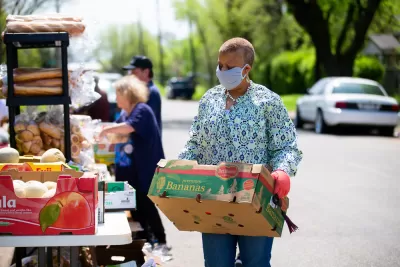A study from Des Moines found that households in historically redlined parts of town are more likely to have to seek help from food pantries.

An article by Linh Ta on Axios highlights the persistent negative impacts of redlining on American communities, citing a recent study from the Des Moines Area Religious Council that finds that households in that city’s historically redlined district are most likely to experience food insecurity.
“The redlined neighborhoods that lacked investment 90 years ago — many of which are on the city's south and east sides — are still suffering from economic instability and lower home ownership rates, according to DMARC.” Some of these areas are also at the highest risk for flooding, the report noted.
“Out of all the food pantry users in the Des Moines metro, about 43% of them live in a former C or D district, said Luke Elzinga, spokesperson for DMARC.” Homes classified as C or D properties were deemed “high risk” for lending. According to the report, “55% of multi-race Hispanic families that visited DMARC's food pantries lived in one of those districts compared to just 38% of white food pantry users.” Elzinga pointed to the need for support in multiple areas to reduce food insecurity among low-income households. “Factors like improving affordable housing options and childcare factor into economic stability.”
FULL STORY: Struggles continue in Des Moines' redlined district

Maui's Vacation Rental Debate Turns Ugly
Verbal attacks, misinformation campaigns and fistfights plague a high-stakes debate to convert thousands of vacation rentals into long-term housing.

Planetizen Federal Action Tracker
A weekly monitor of how Trump’s orders and actions are impacting planners and planning in America.

In Urban Planning, AI Prompting Could be the New Design Thinking
Creativity has long been key to great urban design. What if we see AI as our new creative partner?

King County Supportive Housing Program Offers Hope for Unhoused Residents
The county is taking a ‘Housing First’ approach that prioritizes getting people into housing, then offering wraparound supportive services.

Researchers Use AI to Get Clearer Picture of US Housing
Analysts are using artificial intelligence to supercharge their research by allowing them to comb through data faster. Though these AI tools can be error prone, they save time and housing researchers are optimistic about the future.

Making Shared Micromobility More Inclusive
Cities and shared mobility system operators can do more to include people with disabilities in planning and operations, per a new report.
Urban Design for Planners 1: Software Tools
This six-course series explores essential urban design concepts using open source software and equips planners with the tools they need to participate fully in the urban design process.
Planning for Universal Design
Learn the tools for implementing Universal Design in planning regulations.
planning NEXT
Appalachian Highlands Housing Partners
Mpact (founded as Rail~Volution)
City of Camden Redevelopment Agency
City of Astoria
City of Portland
City of Laramie





























